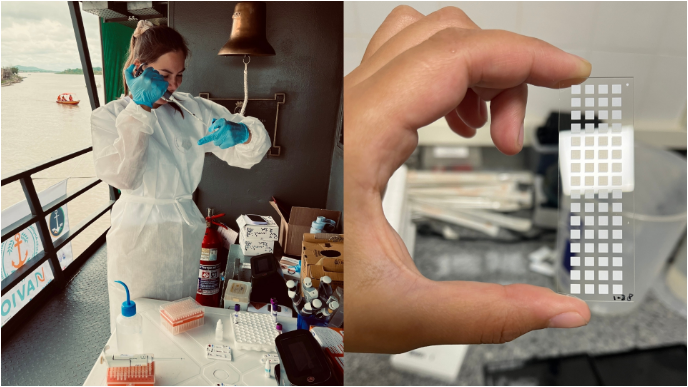The research is part of the NAVIO project (Navigating for Viral Surveillance in Remote Locations), which focuses on the influence of climate changes on the transmission of arboviruses. These are viruses that are transmitted by mosquitoes, such as the dengue virus, Zika virus, yellow fever virus and the Mayaro virus. The project has just started and will run for five years.
'We want to know which viruses we see at that location in Brazil and whether, for example, there are differences between the different communities along the river. We then try to explain these differences,' says Louella Kasbergen (see picture), researcher at the Virology department. 'We also measure and collect data about the climate in different seasons over a long period of time. We use this to investigate the influences of climate change on the spread of arboviruses. Ultimately, we try to make a risk assessment for possible outbreaks in the future.'
 The research team of the NAVIO project, led by Luiz Carlos Junior Alcantara, professor at the Brazilian Fundação Oswaldo Cruz (FIOCRUZ), sails with the Brazilian Navy. “The Marinha do Brasil has been conducting humanitarian missions since 2009 to provide basic care to remote villages on the Paraguay River,” Kasbergen explains. She accompanied the international research team for a few weeks last November.
The research team of the NAVIO project, led by Luiz Carlos Junior Alcantara, professor at the Brazilian Fundação Oswaldo Cruz (FIOCRUZ), sails with the Brazilian Navy. “The Marinha do Brasil has been conducting humanitarian missions since 2009 to provide basic care to remote villages on the Paraguay River,” Kasbergen explains. She accompanied the international research team for a few weeks last November.Antibodies against multiple viruses
Various types of monsters are examined during the missions. Mosquitoes, ticks, sewage and river water, human and animal feces and blood of the inhabitants. “The Navy medical personnel and research team are taking blood and I'm testing it for antibodies. From this you can determine which viruses are circulating within a community. It is a difficult study, because many similar viruses occur there. This means that these people often have antibodies against multiple viruses, which are also very similar.'Because the research group was participating for the first time, the ships still had to be furnished. Kasbergen, together with the researchers and with the help of the navy, set up the laboratory. 'That was an improvisation, because it is very narrow in a ship like that. Hundreds of boxes of heavy equipment, such as freezers, had to go up and down the steep stairs. That at a temperature of 45 degrees. And you hit your head everywhere,” she says, laughing. Due to delivery problems, not all items arrived on time, despite months of preparation. 'It was a hassle, but now everything is there. It is not the lab we are used to at Erasmus MC, but it does work.'
Give something back
During this first mission, Kasbergen wanted to take blood from six hundred people for her research. In the end there were three hundred and twenty. 'We did not only take the blood for our own research, but also wanted to provide direct health care to the residents. That is why, in addition to consulting a doctor or dentist, we also carried out rapid tests for corona, syphilis, hepatitis and malaria, among other things. This way, people actually got something out of it," says Kasbergen.Now that the researcher has returned to Rotterdam, the analysis of the collected blood begins. 'We are already seeing interesting differences between the communities. Explaining those differences is interesting. Why do we see what we see? If we have all the data from the various studies over the next five years, we can draw conclusions.'
'You feel privileged'
At the end of next year, Kasbergen hopes to return to Brazil for her second mission. 'It was a unique experience. It is a completely different way of doing research and you get a glimpse behind the scenes of the Brazilian navy,' she says enthusiastically. 'You also feel privileged. Not everyone in these villages has clean drinking water and for more specialized healthcare they often have to travel days to the nearest town. Then you realize that we have everything here.'The Kasbergen field research is part of a collaboration between the European VEO consortium and the CLIMADE consortium – a collaboration of researchers in the Northern Hemisphere. Both are aimed at research into possibilities for new infectious disease outbreaks that may occur as a result of research.
